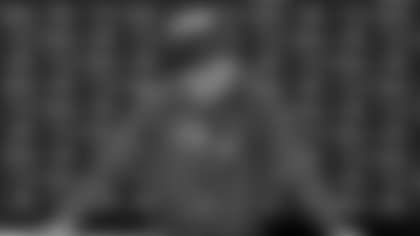BB: OK, well we're rolling along here; final week of training camp. [It's] another important week for us. I feel like we've built a little bit off of each week and into the next week, so hopefully we can continue to do that this week and work on a lot of the things that we need to continue to work on. Build our base in terms of fundamentals, conditioning, things like that. We know the Giants are a similar team to Carolina in terms of a big, physical team and a system that even though they changed coaches, there are a lot of people – particularly the coordinators – that are in place from a year ago essentially. It's a team that has a lot of continuity but also they've added some explosive and I'd say impact-type players to their team. This will be a good test for us down there. Again, with the guys that are on the roster all getting an opportunity to game plan, gain game experience and continue to show, hopefully, their improvement.
Q: There are reports that Bryan Stork failed his physical with the Redskins and that his rights have reverted back to the Patriots. Have you heard anything along those lines?
BB: I don't know if that's official. That sounds like the way it is going to go.
Q: Do you plan to keep him or stick with the original plan of releasing him?
BB: Well, we'll find out exactly what the story is and whenever that is we'll make the best decision that we can.
Q: Can you comment on the reports of Terrance Knighton being released and why it may not have worked out here for him?
BB: No, I don't have any comment on that. It just didn't work out. He came in, worked hard, lost weight, got in good condition, tried to do the things that we asked him to do, but there are just other people ahead of him.
Q: How has Vincent Valentine advanced this summer with the techniques you've taught him here, and are those techniques a lot different than what he would've used in college?
BB: Well, I'd say the players he is playing against are a lot different than what he played against in college; let's start with that. I don't know that the techniques are that dramatically different, but it's a whole different level of competition. He's making progress. He didn't get a lot of playing time in the Chicago game. He played some but he got more last week, so I think that was good for him, good for him to see that. We'll just keep going. He's making progress.
Q: You said when you brought in Anthony Johnson that you weren't sure you had the right guy due to his weight loss. Did you envision a different role for him and then have to adjust that based on the body transformation he went through with the weight loss?
BB: No, we knew that he had done that. We had just never seen him at that weight. He didn't play at that weight at LSU and when he came into the league he wasn't [that heavy], so he was a different player than what we had seen. No, we didn't think he was going to come in here at 330 [pounds] or whatever. If you took – I don't know – if Alan Branch weighed 300 pounds what would he look like? I don't know. You'd have to see that to see what it looks like.
Q: What is a bigger adjustment for a newcomer like Barkevious Mingo, learning the playbook or getting used to the culture?
BB: I don't know, but he has got a lot of catching up to do. We'll spend, and we already have spent a lot of time with it. He has worked hard, he has put in a lot of extra hours already in the brief time that he has been here to try and absorb all of the information that we give him, so we'll see how it goes.
Q: What did you see from him in his time with Cleveland and what can he bring to the team here?
BB: We'll see. He's a versatile player. He has got a lot of skills. We'll see how it all plays out. I don't know. He has rushed, he has dropped, he has played on the line, he has played off the line, he has played in all phases of the kicking game, so we'll see.
Q: How much has James Develin progressed from his years on the practice squad and how nice is it to have him back this year?
BB: Good, it's good to have all of them. Any player that is healthy it is good to have them healthy. James was a conversion from defense and he was a pretty solid player when we had him here on the practice squad but he has improved. Nobody works harder than James. He's very tough, dependable, smart, catches the ball well for a converted defensive player, so he has continued to gradually improve. [He's] a guy I wouldn't say it was that low to start with but it has gotten better with experience.
Q: Is he a guy you watched when he played collegiately at Brown or mostly when he bounced around the league on the practice squad?
BB: No, we saw him mainly at Cincinnati. He was a defensive player in college. I don't think he is a defensive player in this league.
Q: With a player like Barkevious Mingo, how much do you evaluate his college performance versus what he has done thus far in the league?
BB: Well, I think the NFL is a lot more important. It's a lot better of an evaluation. You see him against what we see.
Q: How do you think the playing experience that David Andrews received last year has helped him going into this season and what sort of improvements have you seen from him?
BB: Yeah, well I think that playing time helped any rookie player going into the second year. David played really well for us last year. He's really smart and has a good instinct for playing the center position. He's played it his whole life, since fifth grade or whatever, so he definitely knows how to play in there, but I would say the extra year probably just moves everything along a little bit. [He is] a little bit quicker, a little bit smoother with the identifications. Again, not that any of this I would say was a problem, but it's just better with more experience, and [he's] more decisive, quicker recognition, just more experienced inside and on different plays, and protections, and looks, and where to help, and how long to help a guy, and when you have to leave him for an assignment or sometimes you can't help them at all. Sometimes you can help them a lot depending on what the play is, or the assignment, or the location of the other defensive lineman, or the linebackers as the case may be. It's a lot of little things like that. Kind of tying it together – that's an important part of the center position – is helping the other four guys, two on either side of you, all see the same picture of the people that you're responsible for. A lot of little things, I don't think there is any big [thing], but each protection is different, each play is different, every front that we go up against has a little bit of a nuance that's a little different than the next one. So, it's a lot of little things like that.
Q: When you reinserted Bryan Stork into the starting lineup last year how much internal debate was there about whether or not to continue starting David Andrews at center?
BB: Well, I mean there were a lot of factors involved there. I felt like we had two solid players and we did what we felt was the best for the team, like we always do.
Q: Are there any position groups that you had a lot of questions about when camp started that you feel have improved since?
BB: I think at the start of camp you have questions about everybody, every position, every coach, I mean all of us. None of us have done anything, so until we can individually and collectively raise our levels of performance up then they're not there. It's something we all have to do every year in camp. Like I said, players, coaches, veterans, rookies, whoever you want. It's a new year. You've got to prove it all over again. You have to start all over again. Those questions don't get answered until you get out there and answer them. I know everybody puts together this year's roster based on last year. I think that's hard to do. I just don't buy into that, but I'm in the minority there so it doesn't really matter.
Q: What was your opinion of Colin Kaepernick's decision not to stand during the national anthem this past week?
BB: We're really focused on what we do and getting ready for the Giants, improving our football team. We're not here to talk about political commentary or ideology and all of that.
Q: You mentioned that Cre'von LeBlanc is a guy that has a knack for finding the ball. How do you evaluate a skill like that versus something more traditional such as speed or size?
BB: Well, it's a valuable skill. That's a good question. Logan Ryan is another guy that did it in college. He has done it here. Some guys have a real knack for that, other guys not as much. Sometimes it's a little bit acquired, sometimes it's just instinctive. The best example I ever had was Everson Walls. He didn't technically do hardly anything right from a fundamental standpoint. You would never take another player and say 'Look, do it the way Everson's doing it. This is the way you would want to do it,' but in the end [he had], I don't know, whatever it was 56 career interceptions. It was a lot, it was over 50. He did things but he could find the ball and he had a great instinct for quarterbacks, routes, pattern combinations and so forth, so certainly it wasn't a speed and measureable thing. You would have released him on those measurables. That's why he wasn't drafted, but as a football player he's productive. When I was in Detroit, Lem Barney, [was the] same kind of thing. Len probably had better measurable skills coming out but at that point he made a lot of plays and he made them on his instinctiveness, ball skills, awareness, etc. Ty [Law], I mean Ty was a first round pick, but Ty had that, too. There are a lot of first round picks that don't have that and he had that. It's definitely an important skill and it really probably separates good from great players, or average to good players. It's not the easiest thing to evaluate and sometimes some of those plays are circumstantial more than they are great instinctive plays. They're fortunate the way they happen, but when a guy starts making enough of them then you know it's something a little special. It's tough to evaluate.
Q: How much has that evaluation changed over your time in the league? How likely is a scout to tell you that a player may lack certain measurable skills but that he just has a knack for the ball?
BB: Every year. I think there are those guys every year, and I think the hard part is, in your question Dan [Roche], is taking it from the college level to the pro level. So, you can be a good instinctive college player and have it not be good enough in the NFL, or it might be good enough in the NFL, and sometimes there are other factors that become the overriding factor; speed, quickness, explosion, those kinds of things that maybe those guys just can't get quite close enough to make those plays at this level that they made at a different level. Coming out of college and those things, it's one thing and then seeing that transfer – I'm not saying it doesn't transfer – but transfer it to the level of high-production maybe like it did at the college level just isn't always the case. A lot of those guys end up coming up short just like a lot of the size and speed guys that have the physical talent end up coming up short because they may not have the instinctiveness or awareness or whatever it happens to be, whatever adjective you want to put in there, to do it at this level, whereas in college or high school, whatever, there are measurables; their size, speed, power and all is just enough for them to be better than their opponents. Once that playing field levels out a little bit here then the instinctiveness, awareness, anticipation, those kinds of things, they become more of a factor. But it's a tough thing to evaluate. You need time.
Q: Is the dynamic of letting a backup quarterback start this week so that he can get the feel of what it could be like in play this week?
BB: Again, we talked about this last week. Again, there are a lot of things that would be beneficial in this game. In the end we just have to look at the overall opportunity that we have with our team, with various units, with individual players and try to do what we feel like is best. Are there other things that we'd like to do or are there different ways that we could look at it? I mean, there are. We'll look at those and in the end try to make the decision we feel like is best for our team, which includes the units, includes the individuals, includes where we are. But that's what we'll do. There are benefits to a lot, I'm sure you could bring up a lot of 'If we did this, if we did that,' those would all be good, and they would be, and we do that in the staff meeting. 'We'd like to do this, we'd like to do that,' OK, but what's most important? What is at the top of the list? Or, how can we maybe do two or three things if we do take a certain approach? So, that's what we try to figure out, so we'll see.
Q: The timing is a little bit different this year when the preseason ends to the regular season due to the fact you opened the regular season on a Thursday last year.
BB: Yeah, so we're talking about 16 days [from the Carolina game to the regular season opener], so that's a factor. From Friday [August 26] to the following Sunday [September 11], it's 16 days. We have to take that into consideration, too. Again, whether that overrides something or it doesn't, we'll just have to see, but yeah, it's definitely a consideration.










































